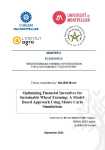Najem M. (2024).
Optimizing financial incentives for sustainable wheat farming: a model-based approach using Monte Carlo simulations. Mémoire (Master 2 MIDAS) : CIHEAM-IAMM, Montpellier (France). 58 p. Master 2 Thesis. Economics. Programme: Mediterranean farming system design for a sustainable food-system [MIDAS]. Co-accreditation University of Montpellier, Institut Agro Montpellier, CIHEAM-IAMM.
| Titre : | Optimizing financial incentives for sustainable wheat farming: a model-based approach using Monte Carlo simulations |
| Auteurs : | M. Najem |
| Type de document : | Thèse, Mémoire, Master |
| Année de publication : | 2024 |
| Format : | 58 p. |
| Note générale : | Master 2 Thesis. Economics. Programme: Mediterranean farming system design for a sustainable food-system [MIDAS]. Co-accreditation University of Montpellier, Institut Agro Montpellier, CIHEAM-IAMM. |
| Langues : | Anglais |
| Langues du résumé : | Anglais ; Français |
| Catégories : |
Catégories principales 06 - AGRICULTURE. FORÊTS. PÊCHES ; 6.4 - Production Agricole. Système de ProductionThésaurus IAMM SYSTEME DE PRODUCTION ; TRANSITION AGROECOLOGIQUE ; CEREALICULTURE ; BLE ; POLITIQUE DE SOUTIEN ; FRANCE |
| Résumé : | The agricultural sector actively impacts the environment, through resource overuse and emissions. At the same time, agri-food systems in France are negatively impacted by the climate trends, creating a cyclical relationship between agriculture and climate change with an almost-cumulative effect, as the agricultural sector both harms and is hindered by the climate. To that end, financial incentives have been proven to be one of the most impactful tools to mitigate the farm activities’ environmental impact, by facilitating the sustainable transitions of farmers. In the private sector, these incentives take the form of sustainability premiums, financial incentives that are proposed in sustainable contract farming under specific terms. The objective of this thesis is to provide a methodology that serves as a tool for stakeholders to optimize these sustainability premiums, according to their aims. To answer the previously mentioned objectives, a model-based approach was developed and applied to a wheat case study in France, using a population simulated with the Monte Carlo method. Three sustainable production systems were established to showcase the model’s potential results. The final results showed that the tool which was developed can simulate different combinations of premiums to propose for said sustainable production systems, showcasing that multiple combinations lead to a 100% adoption rate in the simulated population. |
| Nature du diplôme : | Mémoire (Master 2 MIDAS) |
| Université de soutenance : | CIHEAM-IAMM |
| Ville de l'université de soutenance : | Montpellier (France) |
| Cote : | Réservé lecteur CIHEAM |
| Directeur de Thèse : | Harbouze R.; Bourceret A. |
| Membres du Jury : | Belhouchette H.; Kleftodimos G.; Blanchemanche S.; Bourceret A.; Harbouze R. |







